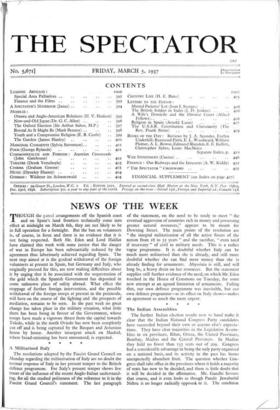The Indian Assemblies The further Indian election results now to
hand make it clear 'that the Indian National Congress Party candidates have succeeded beyond their own or anyone else's expecta- tions. They have clear majorities in the Legislative Assem- blies in six provinces, Bihar, Orissa, the United Provinces, 'Bombay, Madras and the Central Provinces. In Madras they hold no fewer than 155 seats out of 209. Congress had a considerable advantage in being the only party organised on a national basis, and its activity in the past has borne unexpectedly abundant fruit. The question whether Con- gress shall take office in the provinces where it holds a majority of seats has now to be decided, and there is little doubt that it will be decided in the affirmative. Mr. Gandhi favours that course, and it even looks as though Pandit Jawaharlal Nehru is no longer radically opposed to it. The condition that Congress shall make its assumption of office conditional on the Governor pledging himself to use none of his reserve powers is obviously unatmptable, but it is certain that no Governor will use such powers unless he is driven to it. The assumption on which Indian constitutional reform has been carried to its present stage is solvitur ambulando, and that principle holds good still. Provincial autonomy becomes effective on April 1st, and the attitude of the Princes is such that Federation should be an accomplished fact by, or little after, the end of the year.


















































 Previous page
Previous page